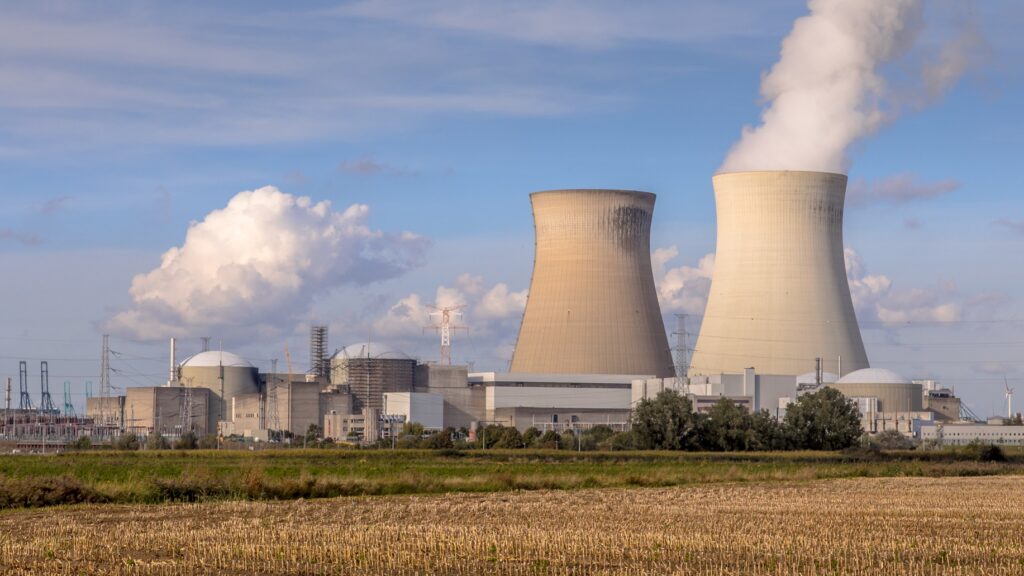Nuclear power generation is a vital part of our modern society, providing us with clean energy and helping to reduce our collective environmental impact. However, the nuclear power generation process is also incredibly demanding on equipment, requiring it to withstand high temperatures and intense pressure.
This is where protective coatings come in, as they can help to extend the lifespan of nuclear power generation equipment and protect it from the harshest conditions.

Why Is Polyurea Used as a Protective Coating in Nuclear Power Plants?
Whether you are looking for corrosion-resistant coatings for nuclear power generation equipment or heat-resistant coatings for nuclear reactors, there are a wide variety of industrial coating solutions available in Canada and the U.S.
High-performance coatings have become an increased area of focus for the nuclear industry with both regulatory authorities and industry recognizing the importance of maintaining robust safety-related coatings in the safety-critical nuclear power plant environment. Standards have been updated and new technologies brought to the table to improve protective coatings utilized in this industry.
First used in nuclear facilities in 1995, one protective coating option growing in popularity in the nuclear power industry is polyurea. Polyurea is an elastomeric substance or, simply put, a synthetic rubber-like material that is created through the step-growth polymerization of a resin and an isocyanate reactive material.
Polymers are combined with synthetic resins and react to form poly units which give it its unique characteristics such as high tensile strength or abrasion resistance while maintaining a high level of flexibility. The resulting product is a type of thermoset coating that is known for its high chemical, abrasion, and heat resistance.
When compared to other protective coatings, polyurea has a number of advantages that make it a preferred choice for use in nuclear power plants.
Benefits of Using Protective Coatings in the Nuclear Power Generation Industry
Polyurea protective coatings are an essential component of the nuclear power industry. These coatings can help to extend the lifespan and improve performance of nuclear power generation equipment, while also reducing the need for regular maintenance.
Water Systems
With nuclear water systems, the nuclear power cycle uses water in three major ways: extracting and processing uranium fuel, producing electricity, and controlling wastes and risks. Utilizing polyurea as a protective coating on the respective water system infrastructure will prolong the life of the facility.
When nuclear sites are no longer in use they need to be decommissioned. Hazards have been reduced on some of these projects by utilizing polyurea. Pond walls are decontaminated by removing sludge and debris through hydrolasing and drainage of the water. This hydrolasing is effective at decontaminating vertical surfaces, however it is less effective on horizontal surfaces because the cleaned surface is easily re-contaminated by liquid effluent. Pond floors that can’t be decontaminated by hydrolasing have been sealed with a polyurea coating to prevent paint degradation and remobilization of actinide (a radioactive metallic element).
Corrosion Resistance
Polyurea protective coatings provide corrosion resistance. Nuclear facilities are located in a wide variety of harsh environments, including coastal regions prone to high humidity and salty air. Protective coatings serve as a barrier between the nuclear power generation equipment and external elements, such as UV radiation, chemicals, and saltwater, thus preventing corrosion and other forms of damage.
Radiation Resistance
Another important benefit of polyurea protective coatings is their ability to resist radiation. Nuclear power plants generate large amounts of ionizing radiation, which can be extremely detrimental to the health and function of equipment. Protective coatings can help to protect against this radiation, preventing damage and allowing nuclear power generation equipment to perform at its best for longer.
Additionally, polyurea has been used to avoid and mitigate environmental catastrophe at nuclear tank farms by forming a surface barrier overtop of buried tanks to assist in managing contaminated liquid waste. It has also been used on the concrete floors and walls of structures overtop of tanks containing highly reactive liquid waste to reduce radioactive permeation from these tanks coming through the concrete.
Heat Resistance
Heat resistance is another key benefit of protective coatings for nuclear power generation equipment. The high temperatures generated by nuclear reactors can be extremely damaging to equipment over time, causing degradation and failure. Protective polyurea coatings help to insulate against this heat, preventing damage and allowing nuclear power generation equipment to function properly for longer.
Abrasion Resistance
In addition to being corrosion- and radiation-resistant, polyurea coatings can also be highly abrasion-resistant. This makes them ideal for use in the nuclear power industry, where equipment is exposed to a wide range of challenges, including exposure to heavy machinery and constant wear and tear.
Leakage Protection
Nuclear reactors generate large amounts of radioactive material, which can be extremely dangerous if it leaks into the environment. Protective coatings can help to prevent this from happening by providing a barrier between the nuclear power generation equipment and the outside world.
Polyurea has also been used to protect the environment from radiation risk when low-level radioactive waste is being transported. It has been used as a protective lining in transport vehicles like railcars.
Chemical Durability
Polyurea coatings are also highly durable against chemicals, making them ideal for use in nuclear power generation facilities. These coatings are able to withstand exposure to a wide range of chemicals, including acids and alkalis, while still maintaining their integrity.
Durability at Simulated Design Basis Accident Conditions
Protective coatings are also highly durable in simulated design basis accident conditions. This means that they can withstand the extreme conditions that may be experienced in the event of a nuclear accident, preventing damage, and allowing nuclear power generation equipment to remain operational.
Improved Lifetime and Performance
Beyond these specific benefits, protective coatings also help to extend the lifespan and improve the performance of nuclear power generation equipment overall. By protecting against corrosion, radiation, and heat, protective coatings help to extend the life of the equipment and prevent degradation. This, in turn, reduces the need for frequent maintenance and repairs, allowing nuclear power facilities to operate more efficiently and reliably.
Given these benefits, it is clear why polyurea is a preferred choice for protective coatings in the nuclear power industry. If you are looking for an industrial coating solution that can provide superior protection, polyurea is an ideal option.
Our Polyurea Elastomeric Protective Coatings for the Nuclear Power Plant Industry
IMC specializes in polyurea protective coating solutions for the nuclear power generation industry. The manufacturers we represent offer coatings with superior protection against corrosion, heat, radiation, and other forms of contamination, making them ideal for use in nuclear power plants.
Contact IMC Distributors to Source Protective Coating Systems for Your Nuclear Power Generation Plant
Whether you are looking to retrofit your existing nuclear power generation equipment or select coatings for a new project, IMC Distributors has a long line of ISOMAT and Nukote products that are ideal for coating applications in the nuclear power generation industry. As one of the leading providers of high-performance advanced polyurea protective coatings in North America, IMC Distributors offers a wide range of polyurea protective coating systems for nuclear power plants. Contact us today to learn more about our products or to get more recommendations for your specific needs.
 Karli Logan is the Owner and President of IMC Distributors which is the exclusive partner of Nukote Coating Systems in Canada. With a B.Sc and M.Sc, as well as a demonstrated history of working across a number of industries, she has a passion to drive significant gains and benefits for IMC’s clients.
Karli Logan is the Owner and President of IMC Distributors which is the exclusive partner of Nukote Coating Systems in Canada. With a B.Sc and M.Sc, as well as a demonstrated history of working across a number of industries, she has a passion to drive significant gains and benefits for IMC’s clients.